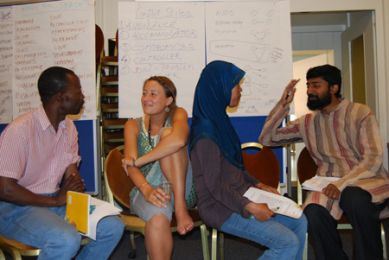Interfaith Youth Seminar Focuses on Conflict Resolution

Training Christian, Muslim, and Jewish youth to become facilitators of peace was the theme of a recent seminar hosted by the World Council of Churches (WCC).
Some 30 youths attended the five-day seminar, entitled "Dialogue for a Peaceful Change," which was held earlier this month at the Ecumenical Institute in Bossey, Switzerland as a part of the WCC's month-long "Building an Interfaith Community" program.
"Whether it is visiting a church, synagogue or mosque, or having formal lectures outlining different faith approaches to contemporary issues, or just socializing and enjoying each other's company – the group is challenged to live together and grow as a community, overcoming stereotypes and preconceived understandings of each other," Tara Tautari, the WCC's program executive for Education and Ecumenical Formation, told the group's news service.
The seminar included several different group exercises, including dialogues where one conversation partner was asked to refuse all proposals of the other, or constantly interrupt the person trying to tell a story, or listen without showing any facial expressions or other reactions.
"The person I was talking to was deaf and dumb," commented Benjamin Adekunle, a participant from Nigeria, after sharing a story with a partner who had been asked not to show any expression.
Colin Craig, an Irish Catholic and the senior coach for the training program, said that he believes heavily in experiential learning.
"Outside of the whole spiritual framework and within which many people on the earth view our existence, religion is also institutional," Craig said. "Religions are a part of the institutional framework of human society. And in that regard they carry the same struggles as other institutions. Families, organizations, and so forth."
"People inside religious institutions also struggle to get on with each other, they don't always agree, they have big fallouts. That's written in the history, internally, of all religions, all the major faiths," he continued. "And…of course, each religion argues that it is closer to the supreme truth than all the other religions because that's what gives them their operational rationale, that gives them permission to promote what they do…and of course that takes them into conflict with those who view the world differently."
Regarding the seminar's activities, Craig said he felt it wasn't so much a "pious" activity but rather a "thrilling" one.
"You really felt that you were on the edge of something, and that you were doing really important work," he said.
Participants' reactions to the seminar were almost as diverse as the group itself, ranging from enthusiastic to skeptical.
For Adrian Kirk, a Muslim student from the United States, the seminar was an eye opener to other faiths.
"It turned out that I didn't know as much as I thought I knew" about Christianity and Judaism, he said. "It was extremely interesting."
Sahar Yasdanpour, and Israeli and one of two Jewish participants in the seminar, said that dealing with conflict in her homeland has to do more with trust than facilitating dialogue.
"We maybe don't trust the other side and that is why it is very hard to do peace," she said. "If this program will give me the answer to the issue of trust, maybe I would be able to do that, but it's hard."
Koni Patrick, a Christian theology student from Nigeria, found the seminar to be very "important and relevant" to her as religious conflict in her country is common.
"I consider this seminar as something that will equip me personally so that I will be able to make a change in my society," she said.